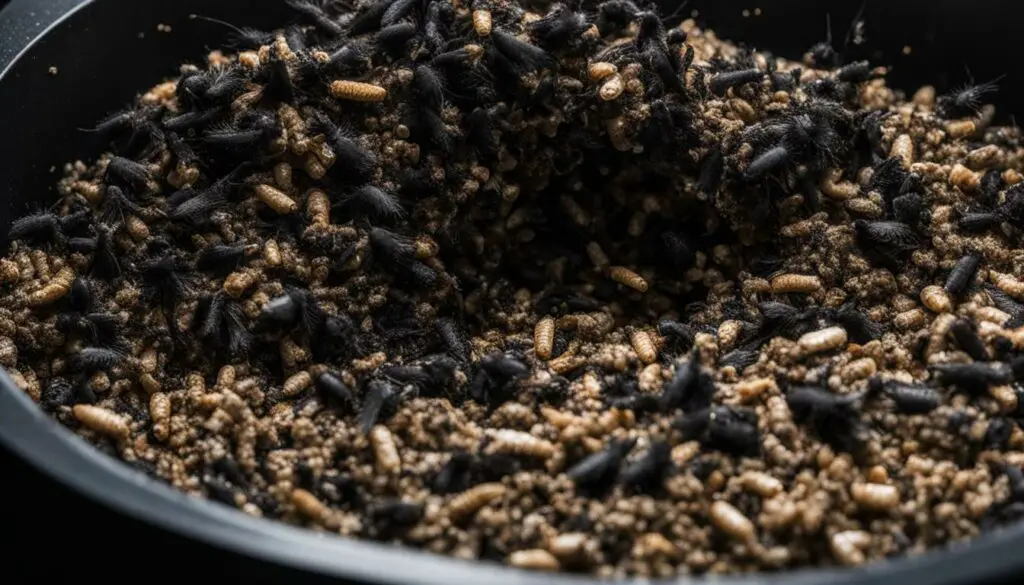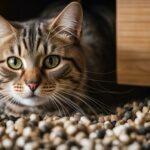Have you ever wondered why your cat’s poop smells so awful? It’s not the most pleasant topic to discuss, but understanding the reasons behind the foul smell can help you improve your furry friend’s health and your household’s odor. In this article, I will explore the various factors that contribute to the not-so-pleasant scent of cat poop and what you can do to address it.
Key Takeaways:
- Cats use urine and feces to mark territory, but the smell can be unpleasant for pet owners.
- Foul-smelling cat poop can be caused by diet, inflammatory bowel disease, parasites, liver or gallbladder disease, pancreatic disease, medications, or stress.
- Healthy cat poop should have a mild smell that decreases after a few minutes.
- Cleaning the litter box regularly and making dietary changes can help reduce the smell of cat poop in your home.
- If attempts to improve poop odor at home have been unsuccessful for a month or if other symptoms like decreased appetite or weight loss are present, it’s essential to seek veterinary care.
What Does Healthy Cat Poop Smell Like?
When it comes to our furry feline friends, understanding what healthy cat poop smells like can provide valuable insights into their overall well-being. Unlike foul-smelling poop, which can be indicative of underlying health issues, healthy cat poop has a mild, earthy, or musky smell that should not stink up the whole house.
Healthy cat poop should be formed in logs and not look wet or stick to the scoop. It should have a firm consistency, resembling Play-Doh, and should be easily picked up without leaving any residue behind. Cats with a low-stress environment and a balanced diet are more likely to produce healthy poop that goes directly into the litter box.
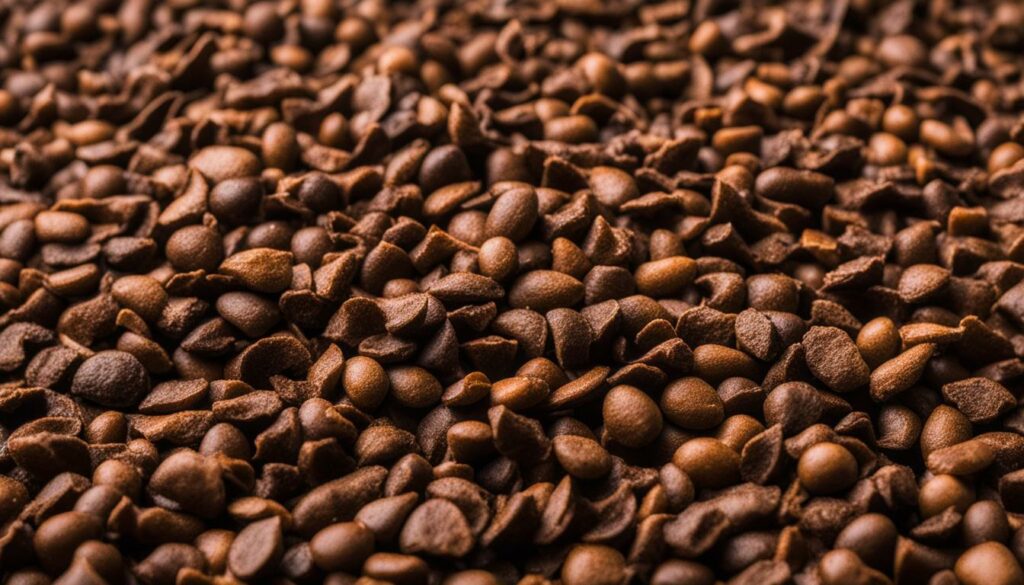
While individual variations in odor perception may exist, it’s important to remember that healthy cat poop shouldn’t have an overpowering or offensive smell. If you notice a sudden change in odor or consistency, it may be worth consulting with a veterinarian to rule out any potential health issues.
Why Does My Cat’s Poop Smell So Bad?
When it comes to our feline friends, foul-smelling poop can be a cause for concern. The unpleasant odor can fill the room and leave us wondering what could be causing it. There are several factors that can contribute to a cat’s poop smelling bad, and it’s important to understand them to address the issue effectively.
Diet
One of the main culprits behind bad-smelling cat poop is their diet. Poorly balanced or hard-to-digest diets can result in smelly feces. Additionally, certain ingredients or foods may cause allergies in cats, leading to foul-smelling poop. It is important to ensure that your cat is consuming a high-quality, nutritionally balanced diet to help improve the odor of their poop.
Inflammatory Bowel Disease
Inflammatory bowel disease (IBD) is another potential cause of foul-smelling cat poop. This condition, often caused by food allergies, can lead to inflammation in the gut. Cats with IBD may experience chronic diarrhea and produce feces with a strong odor. Identifying and eliminating allergens from their diet can help alleviate the symptoms and improve the smell of their poop.
Parasites
Parasites such as roundworms, coccidia, Giardia spp., and Tritrichomonas spp. can upset a cat’s digestive system and result in foul-smelling poop. Kittens and outdoor cats are particularly susceptible to parasite infestations. Testing and appropriate treatment are necessary to eliminate the parasites and improve the odor of their poop.
| Cause | Symptoms |
|---|---|
| Diet | Hard-to-digest foods, imbalanced diet, allergies |
| Inflammatory Bowel Disease | Chronic diarrhea, food allergies, gut inflammation |
| Parasites | Roundworms, coccidia, Giardia spp., Tritrichomonas spp. |
Proper nutrition, addressing inflammatory bowel disease, and treating parasites are essential steps in improving the smell of your cat’s poop.”
If your cat’s poop continues to have a strong odor despite dietary changes or if you notice any other concerning symptoms, it is important to seek veterinary care. A veterinarian can help identify any underlying health issues and provide appropriate treatment or management strategies to improve the odor of your cat’s poop.
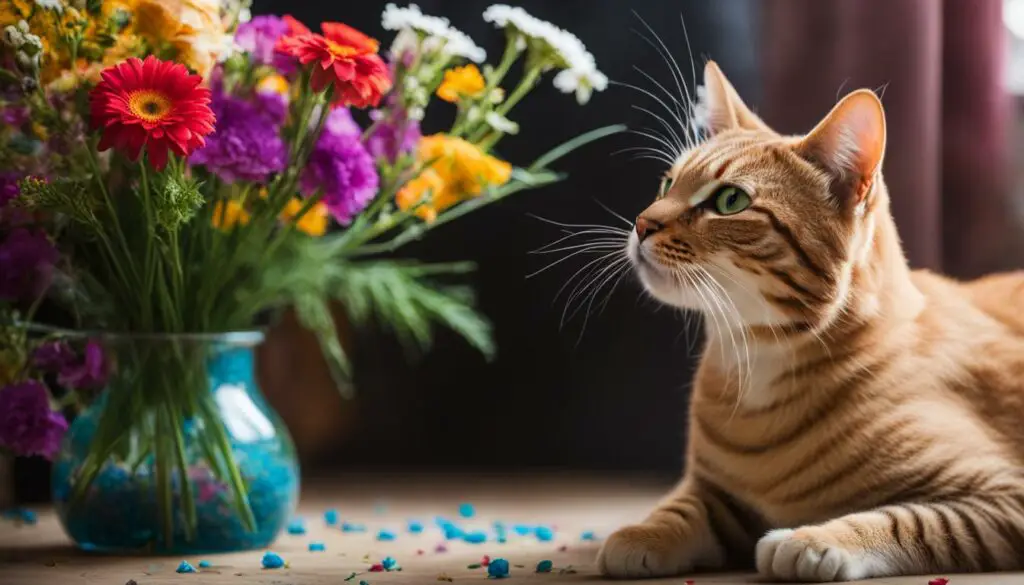
Diet
When it comes to foul-smelling cat poop, the diet is an essential factor to consider. Poorly balanced or hard-to-digest diets can result in smelly poop. Additionally, certain allergies to specific foods or ingredients can also cause foul odors. It is important to eliminate potential trigger foods from your cat’s diet and transition them to a high-quality cat food that is known to improve poop odor.
One way to determine if your cat’s diet is contributing to the smell of their poop is to keep a food diary. This will help you track their intake and identify any potential foods that may be causing the foul odor. Consulting with a veterinarian can also provide valuable insight into the best diet options for your cat’s specific needs.
To summarize, paying attention to your cat’s diet and ensuring they are consuming a balanced and easily digestible diet can help improve the smell of their poop.
Inflammatory Bowel Disease: A Common Culprit for Foul-smelling Poop
The health of our feline friends is of utmost importance, and one common cause of foul-smelling poop in cats is inflammatory bowel disease (IBD). IBD is a condition that causes chronic inflammation in the gastrointestinal tract, leading to a range of uncomfortable symptoms for our beloved pets.
IBD can be caused by various factors, including food allergies. When a cat’s immune system reacts adversely to certain proteins, it triggers inflammation in the gut, resulting in foul-smelling poop. Common allergens for cats include beef, fish, and chicken. However, it’s important to note that not all cats with IBD have allergies, as gut inflammation itself can cause foul-smelling poop.
To diagnose IBD, a veterinarian will typically perform a thorough physical examination, conduct blood tests, and may recommend additional tests such as ultrasound or biopsy. Treatment options for IBD in cats include dietary changes, medication to reduce inflammation, and in severe cases, surgery may be required. It’s important to work closely with a veterinarian to develop a tailored treatment plan for your cat’s specific needs.
Table: Common Causes of Foul-smelling Poop in Cats
| Cause | Symptoms |
|---|---|
| Inflammatory Bowel Disease (IBD) | Foul-smelling poop, diarrhea, vomiting, weight loss |
| Allergies | Foul-smelling poop, itchiness, skin rashes, vomiting |
| Gut Parasites | Foul-smelling poop, diarrhea, bloating, poor appetite |
If you notice that your cat’s poop has a foul odor, it’s important to consult with a veterinarian to determine the underlying cause. They will be able to provide a proper diagnosis and recommend appropriate treatment options. Remember, addressing the root cause of foul-smelling poop is essential for your cat’s overall health and well-being.
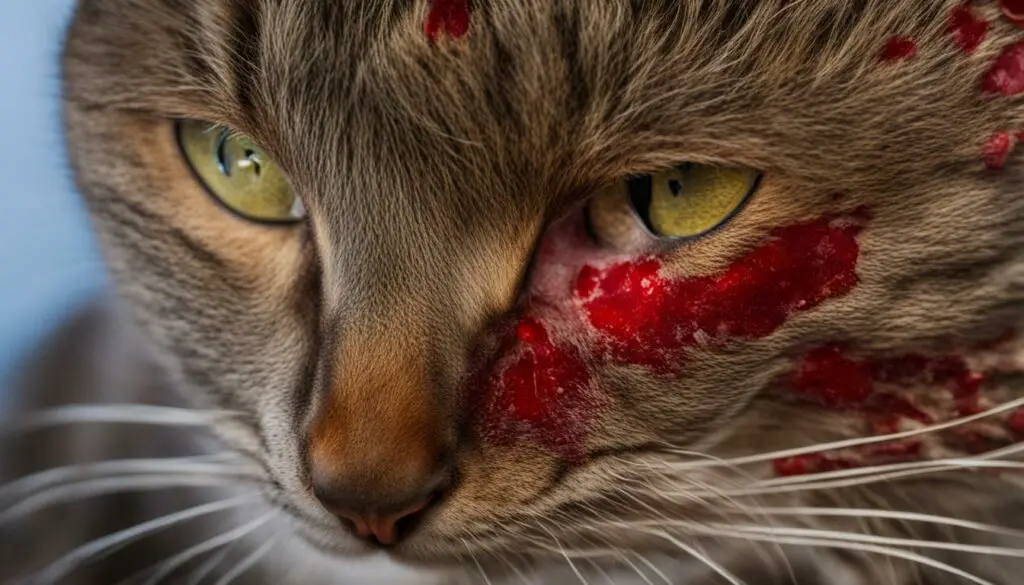
Parasites that Cause Foul-Smelling Feces in Kittens
Parasites are a common cause of foul-smelling feces in kittens. These microscopic organisms can disrupt the normal functioning of a cat’s gut, leading to unpleasant odors. Two common parasites that can cause foul-smelling feces in kittens are Giardia spp. and Coccidia.
Giardia spp. is a single-celled parasite that can infect the intestines of kittens. It is often transmitted through contaminated water or food. Kittens infected with Giardia spp. may experience diarrhea, weight loss, and, of course, foul-smelling feces. Treatment typically involves medication prescribed by a veterinarian.
Coccidia is another type of parasite that can affect the intestines of kittens. It is often contracted through contact with infected feces. Symptoms of Coccidia infection include diarrhea, dehydration, and, again, foul-smelling feces. Treatment usually involves a course of medication to eliminate the parasites.
| Parasite | Symptoms | Treatment |
|---|---|---|
| Giardia spp. | Diarrhea, weight loss, foul-smelling feces | Medication prescribed by a veterinarian |
| Coccidia | Diarrhea, dehydration, foul-smelling feces | Medication to eliminate parasites |
If you suspect that your kitten has parasites, it is important to seek veterinary care. A veterinarian can perform tests to diagnose the specific parasite and prescribe appropriate treatment. Additionally, maintaining good hygiene practices, such as regularly cleaning the litter box and washing your hands after handling your kitten, can help prevent the spread of parasites.
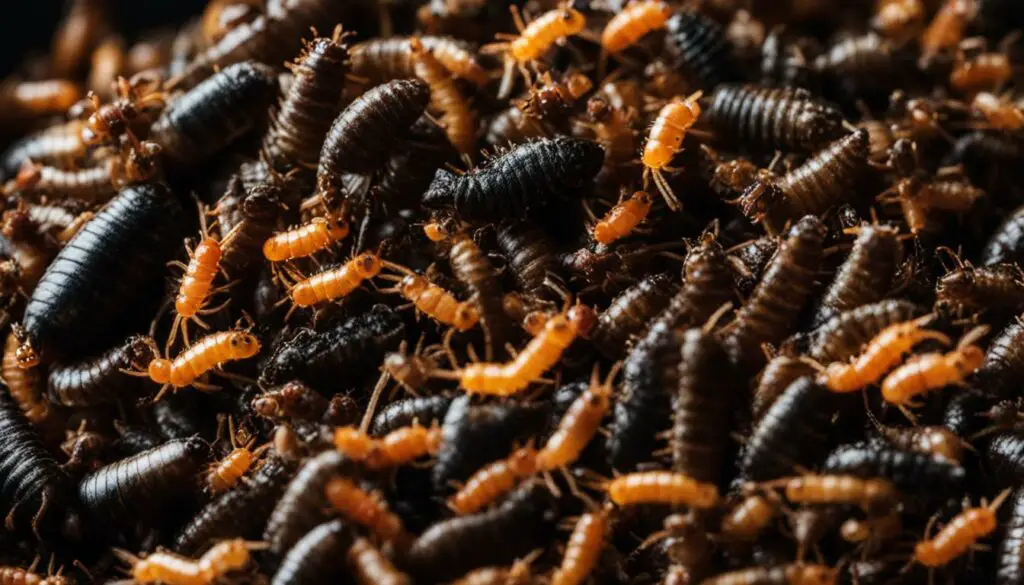
Liver or Gallbladder Disease
Foul-smelling cat poop can also be caused by liver or gallbladder disease. These conditions affect the production of bile, which is essential for digesting and absorbing fats. When the liver or gallbladder is not functioning properly, bile flow can be disrupted, leading to improper digestion and foul-smelling poop.
In cats with liver or gallbladder disease, the poop may have a strong, unpleasant odor that persists even after a few minutes. It may also appear greasy or oily due to the inability to properly process fats. Other symptoms of liver or gallbladder disease in cats can include jaundice, loss of appetite, weight loss, and vomiting.
If you suspect that your cat may have liver or gallbladder disease, it is important to consult with a veterinarian. They can perform diagnostic tests, such as blood work and imaging, to determine the underlying cause and develop a treatment plan. Treatment for liver or gallbladder disease may involve medication, dietary changes, and supportive care to manage symptoms and improve digestion.

Common Causes of Liver or Gallbladder Disease in Cats
The table below highlights some common causes of liver or gallbladder disease in cats:
| Cause | Description |
|---|---|
| Hepatic lipidosis (fatty liver disease) | Accumulation of fat in the liver, often associated with a lack of appetite and rapid weight loss. |
| Gallstones | Hardened deposits that can block bile flow and lead to inflammation and infection. |
| Hepatitis | Inflammation of the liver, which can be caused by infections, toxins, or immune-mediated diseases. |
| Tumors | Abnormal growths in the liver or gallbladder that can interfere with normal function. |
“Liver or gallbladder disease can affect a cat’s digestion and lead to foul-smelling poop. Seeking veterinary care is crucial for proper diagnosis and treatment.”
Section 8: Pancreatic Disease and Foul-Smelling Poop
When it comes to foul-smelling cat poop, pancreatic disease can be a contributing factor. The pancreas plays a crucial role in digestion, producing enzymes that help break down food. However, when the pancreas becomes inflamed or damaged, it can lead to digestive disruptions and foul-smelling poop.
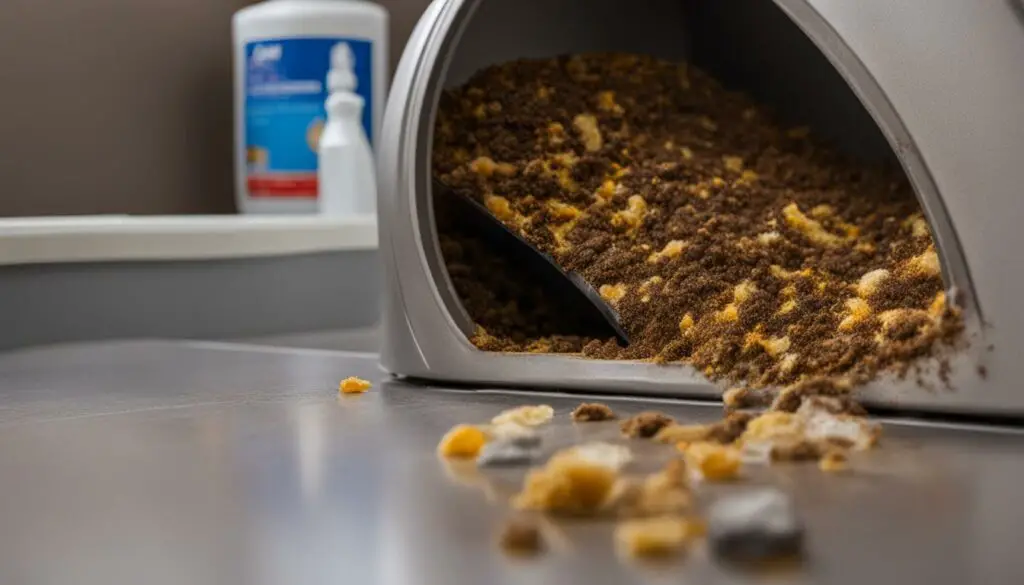
In cases of pancreatitis, inflammation of the pancreas can occur due to various factors, such as diet, infections, or other underlying health conditions. This inflammation hinders the proper functioning of the pancreas, affecting the digestion process and resulting in foul-smelling poop.
If you notice that your cat’s poop has a particularly strong odor and suspect pancreatic disease, it is essential to seek veterinary care. A veterinarian can perform diagnostic tests to assess the health of the pancreas and determine the best course of action. Depending on the severity of the condition, treatment options may include medication, dietary changes, or both.
Medications that Disrupt Gut Bacteria and Cause Foul-Smelling Poop
If you’ve noticed that your cat’s poop has been smelling particularly bad lately, it could be due to certain medications that disrupt the natural balance of gut bacteria. When the delicate ecosystem of the gut is disturbed, it can lead to imbalances and foul-smelling feces. Proper management of medication is crucial to help restore the healthy balance of gut bacteria and improve poop odor.
There are several types of medications that can have this effect on your cat’s digestive system. Antibiotics, for example, are notorious for killing off not only harmful bacteria but also the beneficial ones that help with digestion. This disruption can result in foul-smelling poop. If your cat is on antibiotics, it’s important to follow your veterinarian’s instructions carefully and consider adding probiotics to their diet to help replenish the beneficial bacteria.
| Medications That Can Cause Foul-Smelling Poop | Possible Effects on Gut Bacteria |
|---|---|
| Antibiotics | Disrupt the balance of gut bacteria, leading to imbalances and foul-smelling poop. |
| Steroids | May suppress the immune system and affect gut health, resulting in smelly feces. |
| Non-Steroidal Anti-Inflammatory Drugs (NSAIDs) | Can irritate the gastrointestinal tract and disrupt the gut microbiota, causing foul-smelling poop. |
Other medications, such as steroids and non-steroidal anti-inflammatory drugs (NSAIDs), can also impact gut health and contribute to foul-smelling poop. Steroids may suppress the immune system and affect gut health, while NSAIDs can irritate the gastrointestinal tract and disrupt the balance of gut bacteria. It’s essential to work closely with your veterinarian to manage these medications and minimize their impact on your cat’s digestive system.
Conclusion
Medications, such as antibiotics, steroids, and NSAIDs, can disrupt the natural balance of gut bacteria, leading to imbalances and foul-smelling cat poop. Proper medication management, including following your veterinarian’s instructions and considering probiotic supplements, can help restore a healthy gut microbiota and improve poop odor. Consulting with your veterinarian is crucial to address any concerns or questions about your cat’s medications and their potential effects on digestive health.

Stress and Foul-Smelling Poop in Cats
Stress can have a significant impact on a cat’s digestive system, leading to gut upset and foul-smelling poop. Just like humans, cats can experience stress from various factors, such as changes in their environment, the introduction of new pets or people, or even loud noises. When a cat is stressed, their body releases stress hormones that can disrupt the normal functioning of the gut, resulting in digestive issues and unpleasant-smelling poop.
Managing stress is crucial for maintaining a healthy digestive system in cats. Environmental enrichment, such as providing interactive toys, scratching posts, and hiding spots, can help alleviate stress and provide mental stimulation. Pheromones, such as Feliway, can also create a calming environment for cats and reduce stress-related digestive problems.
How to Recognize Stress in Cats:
- Changes in eating habits or appetite
- Increased hiding or withdrawal behavior
- Excessive grooming or compulsive behaviors
- Urination or defecation outside of the litter box
- Aggression or destructive behavior
If you suspect that stress is causing foul-smelling poop in your cat, it’s important to consult with a veterinarian. They can help identify the underlying cause of stress and recommend appropriate interventions, including behavioral modifications or medication if necessary. Addressing stress can not only improve the smell of your cat’s poop but also contribute to their overall well-being.
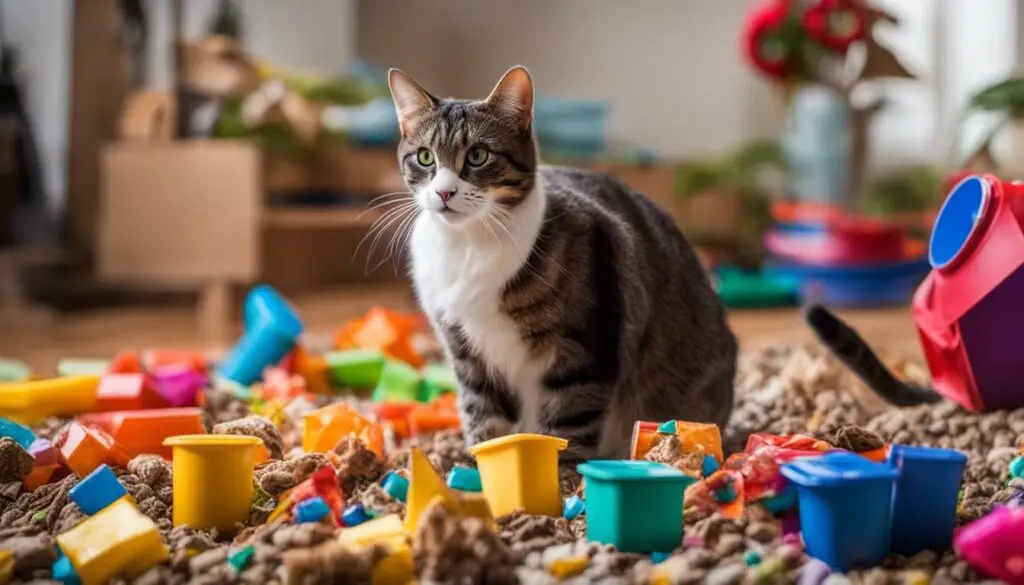
How to Stop Your Cat’s Poop from Smelling Really Bad
If you’re tired of the unpleasant odor that emanates from your cat’s poop, there are several steps you can take to address this issue. By making simple changes to your cat’s diet, incorporating probiotics, and considering medication if necessary, you can help reduce the foul smell and improve your cat’s digestive health.
Diet Change: One potential solution to combat bad-smelling cat poop is to modify your cat’s diet. Consult with your veterinarian to determine if a high-fiber or novel protein diet would be beneficial for your cat. These dietary changes can improve digestion and help alleviate foul odors.
Probiotics: Probiotics are beneficial bacteria that can help restore balance in your cat’s gut. They aid in digestion and can reduce the production of foul-smelling waste. Your veterinarian may recommend a specific probiotic supplement or a prescription-grade option depending on your cat’s needs.
Medications: In some cases, medication may be necessary to address underlying issues causing the bad smell. Your veterinarian can determine if medication, such as antibiotics or anti-inflammatory drugs, is appropriate for your cat’s condition. Always follow your veterinarian’s instructions when administering medication.
| Tip | Description |
|---|---|
| 1 | Consult your veterinarian |
| 2 | Consider a diet change |
| 3 | Incorporate probiotics |
| 4 | Follow veterinarian-recommended medication |
Remember, it’s essential to consult with your veterinarian before making any significant changes to your cat’s diet or introducing probiotics or medication. They will be able to provide specific guidance based on your cat’s individual needs and health conditions.
By taking proactive steps and working closely with your veterinarian, you can help stop your cat’s poop from smelling really bad and create a more pleasant living environment for both you and your furry friend.
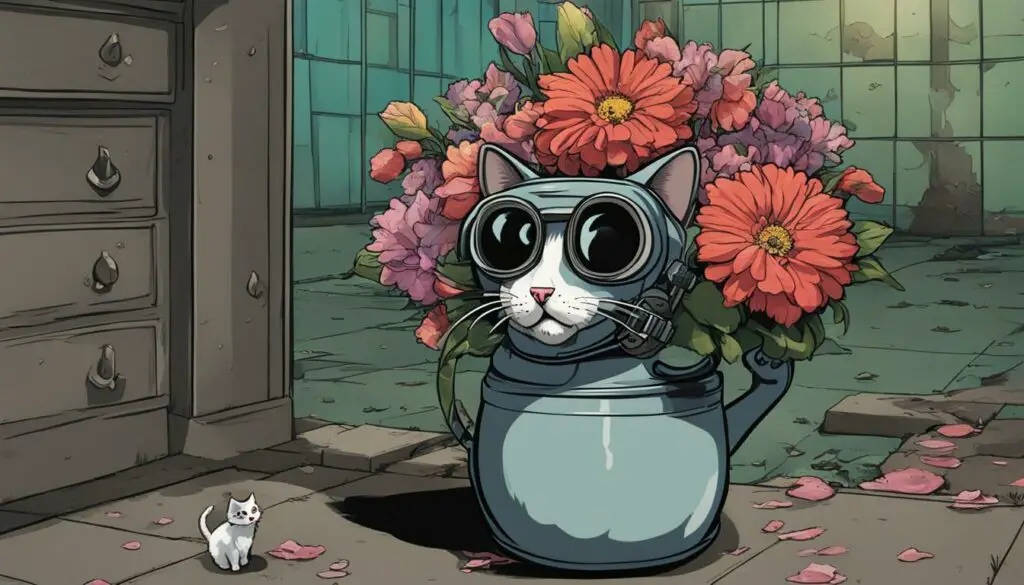
How to Get Rid of Cat Poop Smell
If you’re dealing with a lingering cat poop smell in your home, don’t worry – there are steps you can take to eliminate it. By focusing on proper litter box maintenance, choosing the right litter, using air fresheners strategically, and addressing accidents promptly, you can create a fresher-smelling environment for both you and your feline friend.
Maintain a Clean Litter Box
Regularly cleaning your cat’s litter box is essential for reducing the smell of cat poop. Scoop the litter box at least once a day to remove any waste. Be sure to dispose of the poop in a securely tied plastic bag and discard it in an outdoor trash bin. If your cat tends to have particularly smelly poop, you may need to scoop the litter box more frequently. Aim to completely change the litter and thoroughly clean the box with soap and water every two to four weeks to prevent odor buildup.
Choose the Right Litter
The type of litter you use can also impact the smell of your cat’s poop. Some litters are designed to absorb and neutralize odors better than others. Consider trying a litter specifically formulated to control odor. Clumping litters are often effective in trapping odors and making cleanup easier. Experiment with different types of litter to find the one that works best for you and your cat.
Utilize Air Fresheners
Air fresheners can help mask unpleasant odors in your home. Place them strategically near the litter box to create a more pleasant environment. Choose air fresheners that specifically target and neutralize pet odors. Alternatively, you can use natural odor absorbers such as baking soda, activated charcoal, or cat-friendly plants like lavender or mint.
Address Accidents Promptly
If your cat has accidents outside of the litter box, it’s crucial to clean them up promptly to prevent lingering odors. Use an enzymatic cleaner designed specifically for pet urine and feces to effectively eliminate odor-causing bacteria. Follow the instructions on the product and thoroughly clean the affected area. Be patient, as it may take some time for the area to fully dry and for the smell to dissipate.
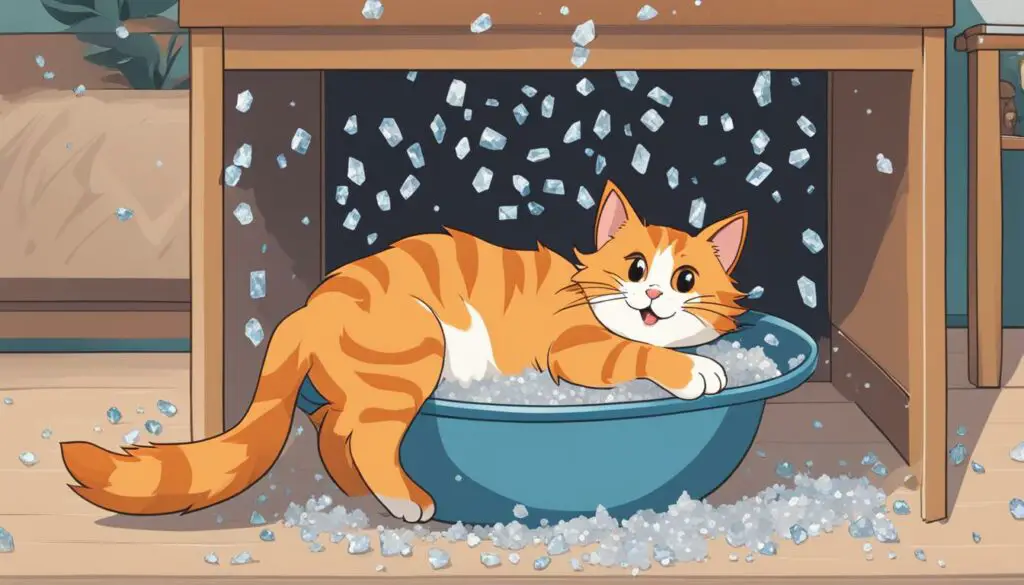
By following these tips, you can successfully combat the smell of cat poop in your home and create a more pleasant living environment for you and your furry companion.
Stinky Cat Poop: When to See a Veterinarian
If you’ve tried to improve your cat’s poop odor at home without success for a month or notice other concerning symptoms like decreased appetite or weight loss, it’s important to seek veterinary care. Persistent foul-smelling cat poop could indicate a serious underlying issue that requires professional attention. Cats can’t communicate their discomfort, so it’s up to us to be vigilant and take action when necessary.
When you visit the veterinarian, they will perform a thorough examination and may recommend diagnostic tests to determine the cause of the foul-smelling poop. These tests could include blood work, fecal analysis, imaging studies, or even endoscopy or biopsy in more complex cases. The results will help identify any underlying diseases or conditions that could be contributing to the problem.
Once a diagnosis is made, your veterinarian will develop a treatment plan tailored to your cat’s specific needs. This may involve dietary changes, medications, or other interventions to address the underlying cause of the foul-smelling poop. It’s important to follow your veterinarian’s instructions closely and provide any necessary follow-up care to ensure your cat’s health and well-being.
Remember, as a pet owner, you play a crucial role in your cat’s overall health. Regular veterinary check-ups and open communication with your veterinarian are essential to catch any potential issues early and ensure your furry friend lives a happy, healthy life. Don’t hesitate to reach out to your veterinarian if you have concerns about your cat’s poop smell or any other health-related matters.
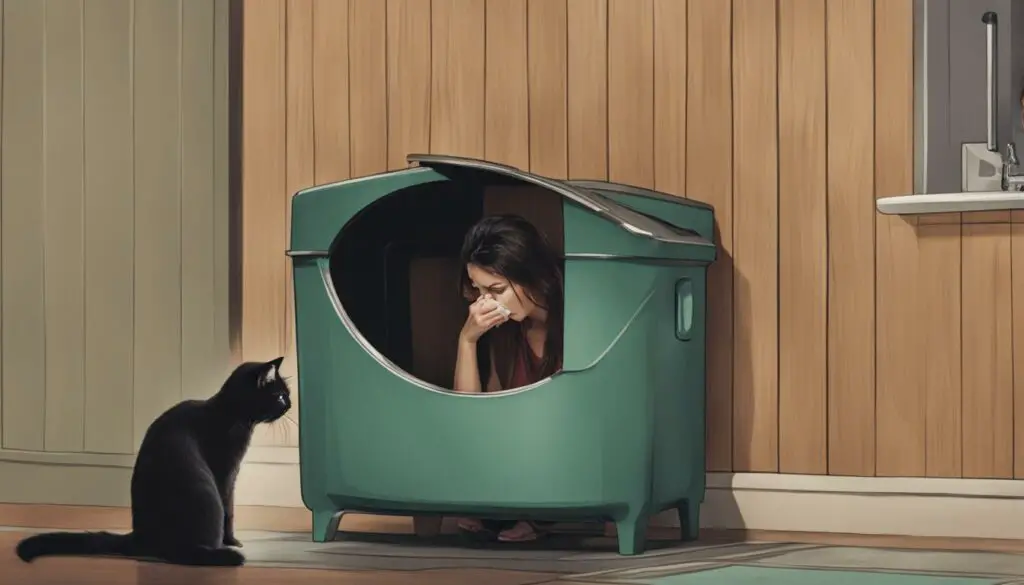
Table: Common Causes of Foul-Smelling Cat Poop
| Cause | Description |
|---|---|
| Diet | Poorly balanced or hard-to-digest diets can result in smelly poop. Allergies to certain foods or ingredients can also cause foul-smelling poop. |
| Inflammatory Bowel Disease | Inflammation of the cat’s bowel, often caused by food allergies, can lead to foul-smelling poop. |
| Parasites | Parasites like roundworms, coccidia, and Giardia spp. can upset a cat’s gut and cause foul-smelling poop. |
| Liver or Gallbladder Disease | Liver or gallbladder disease can affect digestion and lead to bad-smelling poop. |
| Pancreatic Disease | Pancreatic disease, such as pancreatitis, can cause inflammation and affect digestion, resulting in foul-smelling poop. |
| Medications | Some medications, like antibiotics, can disrupt the natural gut bacteria and lead to foul-smelling poop. |
| Stress | Stress can cause gut upset and affect a cat’s digestion, resulting in foul-smelling poop. |
Cat’s Diet
One of the key factors that can significantly impact the smell of your cat’s poop is their diet. Just like humans, what cats eat directly affects the odor and consistency of their feces. Monitoring your cat’s food intake and making appropriate dietary adjustments can help reduce foul odors emanating from the litter box.
A well-balanced and easily digestible diet is essential for maintaining a healthy digestive system in cats. Feeding your feline friend high-quality cat food that is rich in nutrients and free from artificial additives can promote optimal digestion and result in less smelly poop. Look for cat foods that contain real meat as the main ingredient and avoid those with excessive fillers or by-products.
Additionally, it may be necessary to introduce dietary changes if your cat is experiencing frequent foul-smelling poop. Consult with your veterinarian to determine if a switch to a high-fiber or novel protein diet is appropriate for your cat’s specific needs. These specialized diets can help improve digestion and reduce the odor associated with their waste.
Remember that any changes to your cat’s diet should be implemented gradually to avoid gastrointestinal upset. It’s always important to seek professional guidance from your veterinarian before making any significant alterations to your cat’s food.
Clean the Litter Box Regularly
One of the most important steps in reducing the smell of cat poop in your home is to clean the litter box regularly. This ensures that the litter box remains clean and odor-free, providing a pleasant environment for both you and your cat. Ideally, you should scoop the litter box at least once a day, removing any feces or clumps of urine-soaked litter. This prevents the accumulation of waste, which can quickly lead to a strong and unpleasant odor.
In addition to daily scooping, it’s also important to thoroughly clean the litter box on a regular basis. This involves emptying the old litter, washing the box with mild soap and warm water, and drying it completely before adding fresh litter. This not only helps eliminate any lingering odor but also keeps the litter box hygienic and comfortable for your cat. Remember to use unscented litter or one with a mild, pleasant scent, as strong fragrances can be overwhelming for cats and may discourage them from using the litter box.
By maintaining a clean litter box, you can significantly reduce the smell of cat poop in your home. Regular scooping and thorough cleaning not only keep the litter box fresh but also promote good litter box habits in your cat. Make sure to provide multiple litter boxes if you have multiple cats, and consider using litter box liners or litter box deodorizers for added convenience and odor control.
| Litter Box Cleaning Tips |
|---|
| 1. Scoop the litter box daily to remove feces and clumps. |
| 2. Thoroughly clean the litter box regularly with mild soap and warm water. |
| 3. Dry the litter box completely before adding fresh litter. |
| 4. Use unscented litter or litter with a mild, pleasant scent. |
| 5. Provide multiple litter boxes for multiple cats. |
| 6. Consider using litter box liners or deodorizers for added convenience and odor control. |
Conclusion
In conclusion, understanding why your cat’s poop smells bad is essential for maintaining their overall health and well-being. Foul-smelling cat poop can be a sign of underlying health issues such as diet, inflammatory bowel disease, parasites, liver or gallbladder disease, pancreatic disease, medications, or stress.
To address the issue, it’s important to consult with a veterinarian who can provide guidance tailored to your cat’s specific needs. Dietary changes, including high-fiber or novel protein diets, as well as probiotics and medications, may be recommended to improve digestion and reduce the smell of their poop.
Regularly cleaning the litter box and using odor-absorbing air fresheners can also help eliminate cat poop smell in your home. Choosing a suitable litter and promptly cleaning up accidents are additional steps you can take to maintain a fresher-smelling environment.
If attempts to improve poop odor at home have been unsuccessful or if other symptoms like decreased appetite or weight loss are present, it’s important to seek veterinary care. Persistent foul-smelling poop could indicate a serious underlying issue that requires professional attention.
FAQ
Why does my cat’s poop smell so bad?
Foul-smelling cat poop can be caused by various factors including diet, inflammatory bowel disease, parasites, liver or gallbladder disease, pancreatic disease, medications, or stress.
What does healthy cat poop smell like?
Healthy cat poop has a mild earthy or musky smell that should not stink up the whole house. It should be formed in logs and not look wet or stick to the scoop.
What can cause foul-smelling cat poop?
Foul-smelling cat poop can be caused by diet, inflammatory bowel disease, parasites, liver or gallbladder disease, pancreatic disease, medications, or stress.
How does a cat’s diet affect poop smell?
A cat’s diet can contribute to foul-smelling poop. Poorly balanced or hard-to-digest diets can result in smelly poop. Allergies to certain foods or ingredients can also cause foul-smelling poop.
Can inflammatory bowel disease cause foul-smelling poop?
Yes, inflammatory bowel disease, often caused by food allergies, can lead to foul-smelling poop. Common allergens include beef, fish, and chicken.
Can parasites cause foul-smelling cat poop?
Yes, parasites like roundworms, coccidia, Giardia spp., and Tritrichomonas spp. can upset a cat’s gut and cause foul-smelling poop. Testing and treatment are required to get rid of these parasites.
Can liver or gallbladder disease affect poop smell?
Yes, liver or gallbladder disease can affect the production of bile and digestion, leading to bad-smelling poop. Cats with liver or gallbladder issues may need medical intervention to address the underlying cause.
Can pancreatic disease cause foul-smelling poop?
Yes, pancreatic disease, such as pancreatitis, can cause inflammation and affect digestion, resulting in foul-smelling poop. Severe cases may require medical treatment or dietary changes.
Can medications cause foul-smelling cat poop?
Yes, some medications, like antibiotics, can disrupt the natural gut bacteria, leading to imbalances and foul-smelling poop. Proper medication management and probiotic use may help restore balance and improve poop odor.
Can stress affect a cat’s poop smell?
Yes, stress can cause gut upset and affect a cat’s digestion, resulting in foul-smelling poop. Managing stress through environmental enrichment, pheromones, and medication if necessary, can help improve gut health and poop odor.
How can I stop my cat’s poop from smelling really bad?
Consulting with a veterinarian is the first step in addressing foul-smelling cat poop. Diet changes, such as a high-fiber or novel protein diet, can help improve digestion. Probiotics and medications may also be recommended based on the underlying cause.
How can I get rid of cat poop smell?
Regularly cleaning the litter box and using odor-absorbing air fresheners can help eliminate cat poop smell. Choosing a suitable litter and cleaning up accidents promptly also contribute to a fresher-smelling environment.
When should I see a veterinarian for foul-smelling cat poop?
If attempts to improve poop odor at home have been unsuccessful for a month or if other symptoms like decreased appetite or weight loss are present, it’s essential to seek veterinary care. Persistent foul-smelling poop could indicate a serious underlying issue.
How does a cat’s diet affect poop smell?
A cat’s diet can significantly impact the smell of their poop. Monitoring their food intake and making dietary adjustments can help reduce foul odors.
How often should I clean the litter box to reduce cat poop smell?
Regularly cleaning the litter box, scooping feces daily, and thoroughly cleaning the box with soap and water can help reduce the smell of cat poop in the house.
Can I conclude that foul-smelling cat poop is a sign of an underlying issue?
Foul-smelling cat poop can indicate underlying health issues. Understanding the potential causes and implementing appropriate dietary changes and medical interventions can help improve cat poop odor. Regular litter box maintenance and keeping a clean environment also contribute to a fresher-smelling home.

